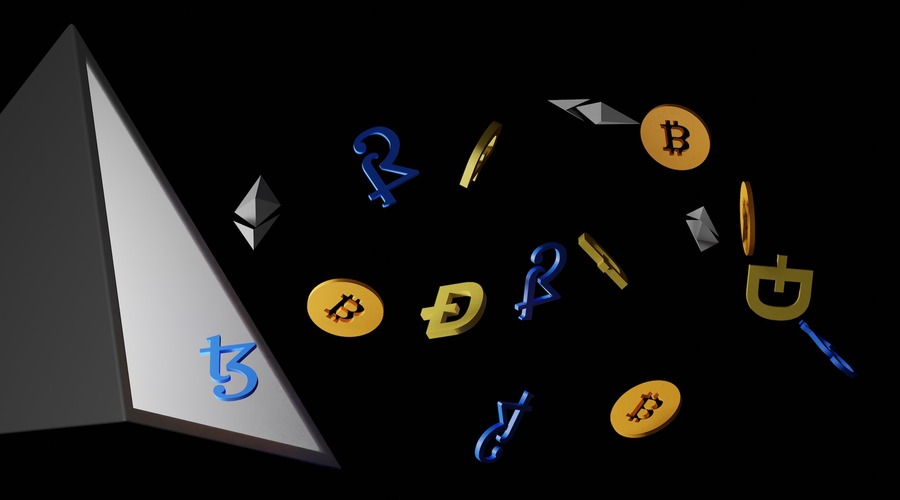In recent years, the rise of decentralized finance (DeFi) has transformed the financial landscape, offering individuals new opportunities to participate in the global economy. At the heart of this revolution lies decentralized exchanges (DEXs), which have gained significant popularity due to their ability to empower users with greater control over their financial assets. This article will delve into the concept of decentralized exchanges, exploring how they contribute to the democratization of finance and the potential benefits they offer to individuals.
Introduction: Understanding Decentralized Exchanges
Decentralized exchanges, often referred to as DEXs, are platforms that facilitate peer-to-peer cryptocurrency trading without the need for intermediaries. Unlike centralized exchanges that rely on a central authority to manage transactions and hold user funds, DEXs operate on blockchain technology and utilize smart contracts to automate the trading process. This decentralized approach eliminates the risks associated with trusting third parties and empowers individuals to have full control over their assets.
The Advantages of Decentralized Exchanges
- Enhanced Security and Trust
One of the key advantages of decentralized exchanges is their enhanced security and trustworthiness. By eliminating the need for a central authority to hold user funds, DEXs minimize the risk of hacks, theft, and mismanagement. Transactions are executed directly between users’ wallets, reducing the vulnerability of funds to external threats. Furthermore, the use of blockchain technology ensures transparency and immutability, making it nearly impossible to alter transaction records fraudulently.
- Financial Inclusion and Accessibility
Decentralized exchanges have the potential to promote financial inclusion by providing access to financial services for individuals who are unbanked or underbanked. Traditional banking systems often exclude certain demographics due to geographical or economic reasons. DEXs, on the other hand, are open to anyone with an internet connection, allowing individuals from all over the world to participate in the global economy.
- Removal of Intermediaries
Traditional financial systems rely heavily on intermediaries such as banks, brokers, and clearinghouses. These intermediaries not only add additional costs to transactions but also introduce delays and complexities. Decentralized exchanges remove the need for intermediaries, enabling peer-to-peer transactions that are faster, more efficient, and less costly.
- Transparency and Privacy
Another advantage of decentralized exchanges is the transparency and privacy they offer. Blockchain technology ensures that all transactions are recorded on a public ledger, providing transparency and traceability. However, the personal identities of users involved in transactions can remain pseudonymous, preserving their privacy. This balance between transparency and privacy is a key feature of DEXs, attracting individuals who value both security and anonymity.
How Decentralized Exchanges Work
Smart Contracts and Blockchain Technology
Decentralized exchanges operate through the use of smart contracts, which are self-executing agreements coded on a blockchain. These smart contracts automate the process of matching buy and sell orders and ensure that transactions are executed as agreed upon. By removing the need for a central authority to oversee trades, DEXs reduce the risk of manipulation and censorship.
Liquidity Pools and Automated Market Makers
DEXs rely on liquidity pools and automated market makers (AMMs) to facilitate trading. Liquidity providers deposit their funds into these pools, which are used to match buyers and sellers. Automated algorithms adjust prices based on supply and demand, ensuring that trades can be executed efficiently even in the absence of a traditional order book.
Examples of Popular Decentralized Exchanges
Some popular decentralized exchanges in the cryptocurrency space include Uniswap, SushiSwap, and PancakeSwap. These platforms have gained significant traction due to their user-friendly interfaces, robust security measures, and wide range of supported tokens. They have become go-to choices for individuals looking to trade cryptocurrencies in a decentralized and secure manner.

The Impact of Decentralized Exchanges on the Global Economy
Disrupting Traditional Financial Systems
Decentralized exchanges have the potential to disrupt traditional financial systems by offering an alternative to centralized intermediaries. As more individuals turn to DEXs for their financial needs, traditional banks and financial institutions may need to adapt their business models to remain competitive. This shift can lead to a more inclusive and efficient financial ecosystem.
Empowering Individuals in Developing Countries
Decentralized exchanges can be particularly empowering for individuals in developing countries who lack access to traditional banking services. By utilizing DEXs, individuals can store, trade, and invest their assets without relying on traditional financial institutions. This newfound financial independence can help individuals overcome economic barriers and stimulate economic growth.
Reducing Financial Inequalities
The democratization of finance through decentralized exchanges has the potential to reduce financial inequalities. By enabling individuals from all backgrounds to access and utilize financial services, DEXs level the playing field and create opportunities for wealth accumulation and economic advancement. This shift from centralized control to individual empowerment has the potential to reshape the global economy.
Stimulating Innovation and Entrepreneurship
Decentralized exchanges foster a vibrant ecosystem of innovation and entrepreneurship. Through tokenization and crowdfunding mechanisms such as initial coin offerings (ICOs) and decentralized finance (DeFi) protocols, DEXs enable startups and projects to raise funds directly from the public. This decentralized funding model opens doors for innovative ideas and promotes economic growth.
Challenges and Limitations of Decentralized Exchanges
Regulatory Concerns and Compliance
The regulatory landscape surrounding decentralized exchanges is still evolving, and there are concerns about compliance with existing financial regulations. As governments and regulatory bodies catch up with the rapid growth of the decentralized finance space, it is essential for DEXs to navigate the regulatory landscape effectively and ensure compliance to maintain trust and legitimacy.
Scalability and User Experience
Scalability remains a challenge for decentralized exchanges. As the number of users and transactions increases, blockchain networks can face congestion and higher fees. Additionally, the user experience of DEXs can sometimes be less intuitive compared to centralized exchanges. Improvements in scalability and user interface design are necessary to enhance the adoption and usability of DEXs. Scalability and user experience are key challenges for decentralized exchanges. As transaction volumes increase, blockchain networks can face congestion, leading to slower processing times and higher fees. Improving scalability and enhancing user interface design are crucial for a seamless and user-friendly trading experience on DEXs.
Security Risks and Vulnerabilities
While decentralized exchanges offer enhanced security compared to centralized counterparts, they are not immune to risks and vulnerabilities. Smart contract bugs, hacking attempts, and phishing attacks are some of the security concerns associated with DEXs. Ongoing research, audits, and the implementation of robust security measures are crucial to mitigating these risks and safeguarding user funds.
Security risks and vulnerabilities are important considerations in the context of decentralized exchanges. While DEXs offer enhanced security compared to centralized exchanges, they are not completely immune to risks such as smart contract bugs, hacking attempts, and phishing attacks. Ongoing research, audits, and robust security measures are necessary to mitigate these risks and protect user funds.
The Future of Decentralized Exchanges
Integration with Traditional Financial Systems
The future of decentralized exchanges lies in their integration with traditional financial systems. As DEXs gain wider adoption, we can expect to see collaborations and partnerships between decentralized and centralized entities. This integration can bridge the gap between the old and new financial paradigms, enabling individuals to seamlessly transition between traditional and decentralized finance.
Interoperability and Cross-Chain Transactions
Interoperability between different blockchain networks is a key focus area for the future of decentralized exchanges. The ability to facilitate cross-chain transactions and seamless asset transfers across various blockchains will enhance liquidity and expand the possibilities for decentralized trading. Projects such as blockchain interoperability protocols aim to address this challenge and enable a more interconnected decentralized ecosystem.
Decentralized Governance and Community Participation
Decentralized exchanges are moving towards more community-driven governance models. By allowing token holders to participate in decision-making processes, DEXs empower users to shape the future direction of the platform. This democratic approach aligns with the core principles of decentralization and reinforces the notion of individual empowerment within the global economy.
Conclusion
Decentralized exchanges represent a significant step towards democratizing finance and empowering individuals in the global economy. With their enhanced security, accessibility, and removal of intermediaries, DEXs offer individuals greater control over their financial assets. While challenges such as regulatory compliance and scalability exist, ongoing advancements and innovations in the space are driving the adoption and maturation of decentralized exchanges. As we look to the future, the integration of DEXs with traditional finance and the continued development of decentralized governance models hold immense potential for reshaping the financial landscape.
FAQs (Frequently Asked Questions)
- What is a decentralized exchange (DEX)? A decentralized exchange is a platform that allows users to trade cryptocurrencies directly with one another without the need for intermediaries.
- How do decentralized exchanges ensure security? Decentralized exchanges utilize blockchain technology and smart contracts to ensure security. Transactions are recorded on a public ledger, providing transparency, while users maintain control over their private keys, enhancing security.
- Can anyone use decentralized exchanges? Yes, decentralized exchanges are open to anyone with an internet connection. They promote financial inclusion by providing access to financial services for individuals who may not have access to traditional banking systems.
- What are the advantages of decentralized exchanges over centralized exchanges? Decentralized exchanges offer enhanced security, financial inclusion, removal of intermediaries, transparency, and privacy compared to centralized exchanges.
- What is the future of decentralized exchanges? The future of decentralized exchanges involves integration with traditional financial systems, interoperability between blockchain networks, and decentralized governance models that empower users to participate in decision-making.



